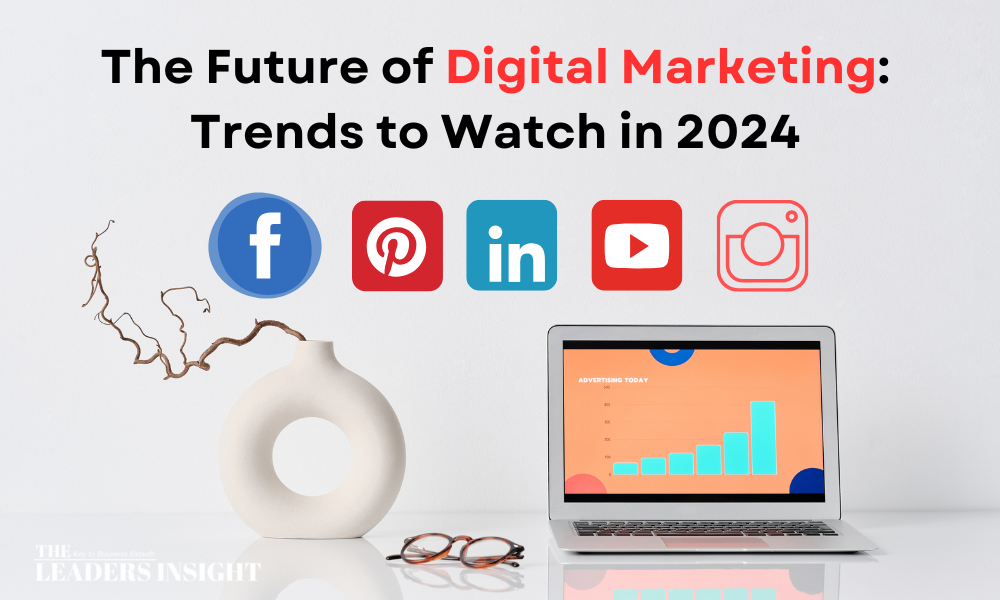The Future of Digital Marketing: Trends to Watch in 2024

In 2024, digital marketing continues to transform, driven by advancements in AI, shifts in consumer behavior, and heightened focus on sustainability. Staying competitive requires businesses to understand these trends, including the rise of personalization, the integration of AI, evolving content strategies, and shifts in data privacy regulations. Here’s a detailed look at the key changes and strategies shaping digital marketing today.
1. AI-Powered Personalization and User Engagement
AI’s potential in digital marketing has surged, particularly in personalization. With the ability to process large amounts of data, AI enables businesses to offer tailored experiences based on user behavior. Studies reveal that personalized interactions can increase engagement and conversion rates, making them a top priority for marketers. From product recommendations to curated content, brands are using AI-driven insights to customize user experiences across websites, social media, and email marketing. However, as AI use expands, marketers must remain transparent about data use, aligning with consumer demands for privacy and ethical AI applications (Think with Google).
2. Content Quality and Long-Form Content Strategies
Quality content remains a central element in building brand authority. According to HubSpot, over 90% of marketers plan to maintain or increase their investment in blog content, podcasts, and other long-form formats. Long-form articles, thought leadership, and case studies help establish brand credibility and enhance SEO rankings, creating enduring value. As brands increasingly use content for brand storytelling, they foster deeper connections with audiences, aligning with the consumer shift towards authenticity and purpose-driven messaging.
3. The Growing Role of Sustainability in Marketing
Sustainability is no longer just a consumer expectation—it’s a strategic imperative. Digital marketers are now integrating eco-conscious messaging into their campaigns and focusing on sustainable practices across the entire marketing process. Companies are investing in “green” marketing campaigns and adopting carbon-neutral strategies as part of their brand identity. Additionally, initiatives like the Ad Net Zero Awards highlight brands and agencies making measurable impacts through sustainable practices. In 2024, we can expect a continued rise in sustainable branding, as consumers increasingly value eco-friendly commitments in their purchasing decisions (Coursera).
4. Shifts in SEO Strategy and the Impact of AI on Search
AI is fundamentally reshaping search engine optimization (SEO). As search engines like Google implement AI-powered tools, marketers are adjusting their SEO strategies to optimize for new formats, including voice and visual search. Additionally, Google’s recent updates, like multisearch, allow users to search with both images and text simultaneously, encouraging marketers to enhance their visual and audio search content. First-party data and a customer-first approach are also becoming crucial as third-party cookies phase out, affecting traditional targeting methods. Adapting to these shifts will be essential for marketers aiming to maintain visibility in search rankings (Coursera).
5. Video Content Dominance and Short-Form Media Investment
Short-form video continues to be a major driver of digital engagement. Platforms like TikTok and Instagram have popularized this format, leading brands to allocate more resources to short-form video production. The effectiveness of short-form videos in capturing user attention has made them highly effective for storytelling, advertising, and brand building. According to a recent HubSpot report, video content consistently ranks as the top-performing content format across industries. Marketers are also increasingly leveraging user-generated content and community engagement, fostering a more relatable and engaging brand presence.
6. Data Privacy, First-Party Data, and Compliance
The landscape of data privacy is evolving with regulatory shifts, especially as tech giants like Google and Apple phase out third-party cookies. In 2024, marketers are focused on gathering first-party data—data collected directly from consumers through platforms like email signups or customer surveys. This shift requires brands to strengthen trust with their audiences, as transparency and consent become central to data collection strategies. New policies like the European Union’s Corporate Sustainability Reporting Directive also emphasize compliance, with organizations facing increased scrutiny over data handling practices (Think with Google).
7. Enhancing Customer Support with AI-Powered Chatbots
AI chatbots have advanced significantly, becoming essential tools for enhancing customer service. By enabling faster, more personalized responses, chatbots reduce wait times and boost customer satisfaction. With improved natural language processing (NLP), these bots can handle more complex queries, providing 24/7 support and freeing up human agents for higher-priority tasks. Studies show that nearly 60% of marketers are increasing their investment in chatbot technology as part of their customer experience strategies. By combining AI with human oversight, brands can achieve a balanced and efficient approach to customer support (Coursera).
8. Community Building and Social Media as E-Commerce Hubs
In 2024, social media platforms are increasingly functioning as e-commerce hubs, allowing users to shop directly from posts and stories. Platforms like Instagram, Facebook, and TikTok are optimizing for social commerce, with features that enable seamless in-app purchasing. This shift presents an opportunity for brands to create cohesive online communities around their products and services. Authenticity is critical, as consumers gravitate towards brands that engage meaningfully and support community building. According to TINT’s recent report, 82% of consumers are more likely to buy from brands with engaging online communities, a trend that underscores the power of social-driven e-commerce (Think with Google).
